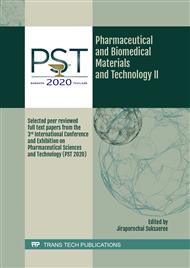p.3
p.9
p.15
p.21
p.27
p.34
p.39
p.45
p.51
Combination Effects of Gambogic Acid on Imatinib Mesylate Cytotoxicity in Colon Cancer Cells
Abstract:
Imatinib mesylate (IM) is a kinase inhibitor with inhibitory effect on colon cancer cell proliferation. However, some adverse effect of imatinib and drug resistance are challenges for maintenance the therapeutic effect with lowering the dose; thus, the combination with other substances was of interest. Gambogic acid (GA), a natural compound from gamboge, was revealed for inhibition of cell proliferation in many types of cancers. This research aimed to investigate the effect of GA on IM response in colorectal cancer cells, HT29 and HCT116. The 50% inhibitory concentration (IC50) of IM and GA was determined. Concentrations which lower than IC50 of each compound were combined and tested for the combination effects on HT29 and HCT116 cells. The results were analyzed using isobologram to assess the types of interaction. The combination index (CI) of the tests was calculated at the 3 different percentages of inhibition (IC50, IC60 and IC70). The finding indicated that IC50 and IC60 of the combination of 5 and 7 μM IM with 0.2-1.2 μM GA showed antagonism while IC70 showed additive effect in HT29 cell line. In HCT116 cell line, IC50 of 10 μM IM with 0.1-0.8 μM GA showed antagonism while IC60 and IC70 expressed additive effect. For the studies with IC50 and IC60 of 12 μM IM with 0.1-0.8 μM GA showed antagonistic result while IC70 showed additive effect. The result indicated that, at the lower IC studied, the CI obtained from the experiments indicated the inhibitory effects, while the higher IC, the results showed the changing trend from antagonistic to additive and synergistic effects of GA on IM.
Info:
Periodical:
Pages:
27-33
DOI:
Citation:
Online since:
August 2020
Keywords:
Price:
Сopyright:
© 2020 Trans Tech Publications Ltd. All Rights Reserved
Share:
Citation:


